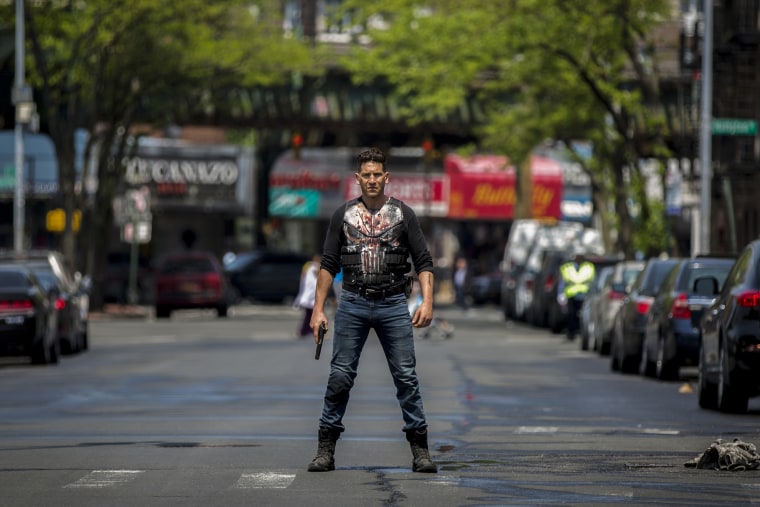If you thought 2018 was supercharged, get ready for 2019. Though last year featured the one-two punch of “Black Panther” and “Avengers: Infinity War,” in total, there were only six live-action superhero films released. This year will see that number grow by at least a third, depending on how you define the genre. Superhero representation on the small screen will also increase, with over 20 superhero series debuting across various platforms.
Unfortunately, the Marvel series that kicks off the Year of the Superhero is also the one that strips the genre down to the right-wing reactionary elements that (often) underpin it. Marvel’s "The Punisher” arrived on Netflix Friday morning, with an argument that would make any NRA lobbyist smile: guns are a superpower.
The Marvel series that kicks off the Year of the Superhero is also the one that strips the genre down to the right-wing reactionary elements that (often) underpin it.
Like the comic world before it, Hollywood loves to portray its tales of superhero derring-do as morality plays. Superman is billed as “truth, justice, and the American way,” Because he’s what children are supposed to aspire to be. “X-Men” in 2000, the first of what would become many “X-Men” movie spin-offs, sequels and prequels, is a plea for tolerance and acceptance of the LGBTQ community. The “Iron Man” movies are stories that rebuke our supposedly bloodless technological war machines. (Bloodless on our side, maybe.) The “Captain America” films are moral testaments to what happens when we trade away our freedoms for security.
But at their core, superhero narratives are generally about how society's laws cannot protect us. While these films and TV shows seem to champion morality, individualism and vigilante justice generally win out. To put it bluntly, almost every story's moral boils down to "the only person who can stop a bad guy with a superpower is a good guy with a superpower."
In the world of Marvel there are two categories of superheroes: “the gifted people” and the “enhanced.” (This is a real thing. The bureaucratically-minded “Agents of S.H.I.E.L.D.” actually broke it down in an episode.) Gifted people are those who have their powers embedded in their DNA, either at birth, or later after some scientific experiment. “The X-Men,” “Spider-Man,” and “Captain America” franchises all fall into this group.
Then there are the enhanced heroes, those who either trained themselves or built themselves into something super. Daredevil and Iron Man are two examples. The Punisher technically falls under this heading too, but he didn’t build himself a suit, nor did he train from childhood to be a ninja of the highest caliber. He just joined the Marines.
Frank Castle doesn't have super skin, or seismic strength. He doesn’t have technological enhancements. But he can shoot his gun very, very well. He is an NRA poster boy.
He’s not even a fighter of extraordinary caliber. His physical altercations don't have Daredevil’s brutal but balletic cadence; There are no “one-camera-take hallway fights” here. In fact, when the show does attempt to set the Punisher's fights to music (as it does early on in season two with a bar fight set to Janis Joplin), it only serves to highlight how graceless the violence is. He wins because he punches harder and is more willing to kill with his bare hands.
But the Punisher’s real talent isn’t punching — it’s firing guns. Remember, guns are his superpower. That means the series, at its core, argues the only thing stopping a bad guy with a superpower is a good guy with a gun. No wonder “The Punisher” seems to have found a loyal fan base among extreme right-wing men.
No one should be surprised by this. The first season made the same argument. And yet, both the show’s star Jon Bernthal and showrunner Gerry Conway have seemed shocked when questioned about the show's fringe appeal. When Bernthal was asked about the alt-right marchers in Charlottesville who wore Punisher skull logos along with their confederate flags, for example, his response was an unprintable epithet. When Conway was asked about law enforcement officials who brandished the logo while on or off the job, he called the idea offensive.
Perhaps because of this, the new season of “The Punisher” feels more aware of its reputation this time around. The opening episode, in particular, is striking because of its lack of violence — at least for the first 35 minutes or so. The episode even takes a page from the now-canceled “Luke Cage” series and features a musical guest star, Shooter Jennings, who plays no less than five songs over the course of the premiere.
The addition of Jennings makes for a surprisingly pleasant change of pace. It’s also not the only time the show attempts to cut down on the bloodshed, aiming for plots that are more clearly positioned against right-wing elements. There’s even a tender subplot where Castle takes on a sort of female protégé (Giorgia Whigham, herself no stranger to controversial series, having starred in Netflix’s “13 Reasons Why”), though the exposition feels at times like Marvel’s take on "Leon: The Professional.”
Chances are, this is the last round of “The Punisher,” as Netflix has canceled all the other Marvel TV series but “Jessica Jones.” (And even "Jessica Jones" is probably only still alive because it has another season in the can it doesn't want to waste.) "The Punisher" certainly has its fans, but what it really should be known for is pulling back the curtain on the way the superhero genre can encourage the worst in us. While some of Netflix's Marvel shows will be missed, and could perhaps be rebooted down the line, “The Punisher” is not one of them.

